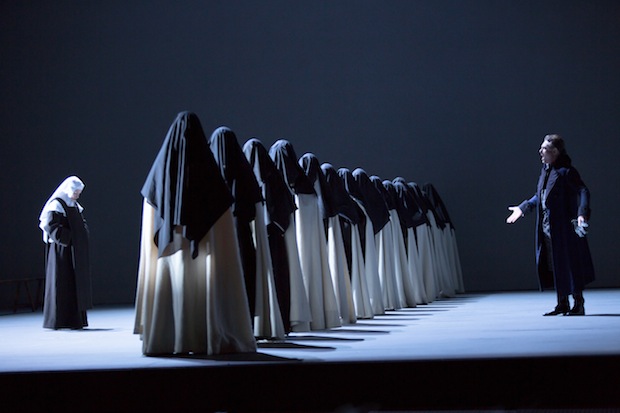Poulenc’s Dialogues des Carmélites is an audacious work, much more so than many others that advertise their audacity. It deals with Love and Death, the central topics of opera, but the love is that of God; and death, rather than being a romantic consummation or a stirring tragedy, is something to be terrified of. The central character, Blanche de la Force, is terrified of life too, and her determination to enter a convent is seen initially as an attempt to escape, so that in the powerful second scene of the opera, after being given a hard time by her father and brother, she is subjected to searching questions by the Old Prioress, herself very ill and shortly to face death. Blanche survives the questioning, only to find, first, that Sister Constance, one of her fellow nuns, is too cheerful for her taste, and then to have to witness the horrific final hours of the Prioress, deserted by her faith, in excruciating pain, her last experience being her dark night of the soul, a life of prayer ending in the terror for which she reproached Blanche.
That is Act I, up to the interval in the Royal Opera’s superb new production. It sounds gamey, and anyone who knew Poulenc’s other works, even the great choral pieces, might wonder if he could bring it off without lapsing into cloying pathos or kitsch. Wonderfully, the answer is that he does. He manages to move between the various idioms he cultivated in his bracing instrumental works, the easy colloquial flow of the songs, and the sub-Stravinskyan choral music, without any seams showing. The staple of the dialogues is convincing, without one’s ever feeling that they might as well be spoken. The Debussy of Pelléas and much more Mussorgsky’s Boris are evident but not intrusive elements, some of the Old Prioress’s death scene being almost lifted from the latter. Yet the overall shape and movement of the opera is Poulenc’s own, and largely successful. There are places, especially in Act II, where one could feel that he had fallen in love with that mode of composing to such an extent that he found it hard not to go on doing it indefinitely. I’ve always felt that there are longueurs in Dialogues, mainly, I think, because of the more or less unvarying pace of the music and action for lengthy stretches. However, it all comes together in Act III, which concludes with the celebrated scene in which the sisters sing the ‘Salve Regina’ while the guillotine reduces their number at a realistically rapid rate. That scene can easily seem camp, but at the Royal Opera it produced — as indeed the whole work did — an impressed silence. But whereas Poulenc directs that the sound of the guillotine should be ‘heavy and dull’, we had alarming sharp swishes that made me feel I needn’t shave for several days.
Robert Carsen’s production is simplicity itself, just what is needed. And Michael Levine’s set designs consist of a bare stage, with what may well be the gigantic blade of the guillotine lowered over it, and appropriate bits of scenery brought on when necessary. The only time the stage is cluttered, briefly, is when the convent is sacked by the revolutionary mob. Costumes are broadly of the late 18th century, as they must be. The cast is distinguished, with Thomas Allen, Blanche’s tetchy father, in phenomenal vocal form. Sally Matthews is Blanche, ideal as actress and in appearance, and singing quite beautifully: I take it she was singing the French text, but it was hard to be sure. To a lesser extent that was true of several of the cast, and robbed the conversations of which the work consists of about 40 per cent of their possible impact. Deborah Polaski, the great singing actress, made her first appearance for the company since 1998 — how is it possible? Her Old Prioress showed us what we have been missing, though even she seemed less at home than if she had been singing German. Anna Prohaska made her house debut as Sister Constance, a welcome centre of happy faith, what one takes it a nun should be. They and their excellent colleagues are conducted by Simon Rattle, who tended to drive too hard or relax too softly, no doubt to generate contrasts. He could knock 20 minutes off the performance with benefit. What was really tremendous was the threatening crowd of revolutionaries, many of them recruited from Streetwise Opera and Synergy Theatre Project, ex-prisoners and long-term unemployed. Their menace was immense. Is Dialogues a masterpiece? Is it neglected? The answer is probably no to both questions, but it is, when performed at this level, a noble, enriching experience.
The Met HD relay season ended feebly, with a production of Rossini’s La Cenerentola which treated it as broad farce, ignoring the pathos, violence and cruelty of the piece and making it a series of show-off pieces for Joyce DiDonato and Juan Diego Flórez, though neither seemed to have their heart in it. Fabio Luisi, of whom I had high hopes a few years ago, seems now to be merely another Kapellmeister. Misery was compounded by frequently frozen pictures and sound drop-outs, which may have been only in the cinema I was in but might have been universal. The two hours of Act I seemed very long.






Comments